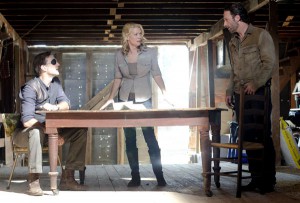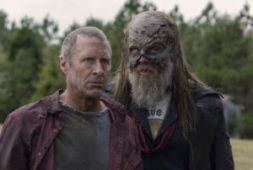
Do the needs of the many outweigh the needs of the few? Or, to put it another way, when one person is sacrificed in order to save a whole group of people, is the sacrifice justified?
You may have encountered these questions in a psychology or ethics class and my guess is that the discussion was probably lively. Many people think that collective good always trumps the individual.
Dr. Spock thinks this the only logical conclusion in my favorite Star Trek movie ever – The Wrath of Kahn. But usually, our feelings about this depend on who the individual is. I am sure that my 10-year-old son would think that it would be perfectly okay to sacrifice his little sister for the good of the family, but he might not think the same way about himself (or his mother). As usual, many of the most difficult questions are a matter of perspective.
This week on The Walking Dead, Rick is faced with this terrible dilemma when he has a surprise one-on-one visit with the Governor. The episode is called “Arrow on the Doorpost,” an apparent reference to a symbolic declaration of war by Native American Warriors. In this episode, Rick and the Governor meet in an old barn in order to try one last attempt at diplomacy before more blood is spilled. We don’t really know how this meeting came about, but the two of them want to talk and neither of them want Andrea in the room with them while they parlay.
Equally interesting is the fact that Milton and Hershel get to talk science outside while Daryl and Caesar get into a Walker killing contest while they wait. Of course, Daryl wins and his reward is a pack of camels from a dead walker’s pocket. Eventually, they share a cigarette together like Wile E Coyote and the Sheepdog during their lunch break. We know that at any minute they might have to “clock in” and actually have to fight each other (sorry Caesar, you are way outmatched).
Inside the barn, the Governor has a proposal for Rick. He suggests that if they would just give him Michonne to him, he will let everyone in the prison live in peace. Rick is clearly distrustful of the idea.
Rick: You could have a statue of yourself in the town square, Governor. Killing Michonne is sort of beneath you, don’t you think?
The Governor: You could save your son. Save your daughter. Everyone you know. It’s your choice.
Rick: If I give you Michonne, how do I know you’ll keep your word that you’ll stop?
The Governor: You can have everything you want. I told you, I don’t care about you. You think about it. Two days.
It is a very interesting proposal from the Governor. If they would just sacrifice Michonne, they will all be able to avoid war. And at the end of the episode we hear that Rick is actually thinking about it when he asks Hershel to talk him out of the idea. But this is the Governor we are talking about, and he surely should not be trusted. This is confirmed to us later when he tells Caesar to kill Rick, Daryl and Merle if they bring him Michonne.
But this is a typical ethical dilemma in the world of The Walking Dead. Life is cheap and death is so prevalent that people have to make these kinds of choices all of the time. For the governor, this isn’t even a difficult question. The governor has already made it clear that he would sacrifice anyone or anything to keep his power. Rick, on the other hand, is starting to develop a more complicated ethical mindset. The people staying in the prison are actually becoming his family, and even if the Governor was being honest, Rick wouldn’t sacrifice family.
As a Christian, this question has multiple layers. On the first hand, part of our core beliefs include Jesus’ sacrifice on the cross. This individual sacrifice is literally what saves all of us. In addition, Christians throughout history have sacrificed their own lives to save others, many of them claiming that it is the ultimate Christlike act.
On the other hand, Jesus taught something a little bit different when it comes to questions of the individual verses the group. Take a look at Matthew 18:12-14 where Jesus tells one of His more famous parables.
“If a man has a hundred sheep and one of them wanders away, what will he do? Won’t he leave the ninety-nine others on the hills and go out to search for the one that is lost? And if he finds it, I tell you the truth, he will rejoice over it more than over the ninety-nine that didn’t wander away! In the same way, it is not my heavenly Father’s will that even one of these little ones should perish.” (NLT)
In this amazing story, Jesus is obviously saying that God cares about each and every one of us. He doesn’t look at us all like pawns on a chessboard, where some of us need to be sacrificed for the better good. He is able to love each and every one of us like we are His own children.
I think that there is no doubt what Jesus would think about this kind of dilemma. He would say that there is no group big enough to justify the sacrifice of the individual. But that didn’t stop Him from sacrificing himself on the cross. What is the difference? His sacrifice was His own choice. He wasn’t just unwillingly thrown on the alter by the masses like a Pagan ritual sacrifice. It was clearly His will that he would die. This is the same for the martyrs throughout the history of the church.
Often when this ethical question is introduced, it is more about whether another person should be sacrificed. It becomes a question of which lives are more important. Is the King more important than his subjects? Is the doctor more important than the homeless person? (Anyone want to play the game of Lifeboat?)
Is society more important than the individual? Are the group at the prison more important than Michonne? Jesus clearly does not think so.
SEASON 3, EPISODE 13 DISCUSSION QUESTIONS:
1) Hershel and Milton are enemies yet they find themselves laughing together while they wait for Rick and the Governor. What does this say about humanity in the face of conflict?
2) Do you think that Daryl and Caesar would be friends in another circumstance?
3) Andrea is surprised when both Rick and the Governor ask her to leave. Why do you think they didn’t want her in the room?
4) Andrea gets in the car with the Governor after the meeting. Was this the right choice? Why or why not?
5) Do you think that Rick knows that giving up Michonne will not actually bring about peace?
6) Why do you think Rick asks Hershel to talk him out of the idea of giving up Michonne?
7) Would giving up the individual (Michonne) actually help the group?
8) Even if the governor would keep his word (which he wouldn’t) would it be right to give up Michonne, even though more people would die?
9) Have you ever sacrificed a relationship with a person to be part of a group? If so, was it worth it in the long run?
10) Has someone ever sacrifice their relationship with you to be part of a group? How did that make you feel?
11) What do you think Jesus would want you to do in this type of situation?
Thom McKee Jr. is a husband, father, pastor… and film geek (and brother of Jonathan McKee). Thom lives in Northern California with his wife and two kids.
Jonathan McKee
Jonathan McKee is the author of over twenty books including the brand new The Guy's Guide to FOUR BATTLES Every Young Man Must Face; The Teen’s Guide to Social Media & Mobile Devices; If I Had a Parenting Do Over; and the Amazon Best Seller - The Guy's Guide to God, Girls and the Phone in Your Pocket. He speaks to parents and leaders worldwide, all while providing free resources for youth workers on TheSource4YM.com. Jonathan, his wife Lori, and their three kids live in California.



